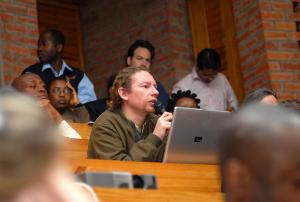 South Africa is one of several countries that possesses a “notice and take down regime” for online content, meaning that internet service providers are obliged to take down content that is deemed controversial by a complainant. Understanding this regime as unconstitutional since its inception in 2002, a lawyer has embarked on crusade to change it.
South Africa is one of several countries that possesses a “notice and take down regime” for online content, meaning that internet service providers are obliged to take down content that is deemed controversial by a complainant. Understanding this regime as unconstitutional since its inception in 2002, a lawyer has embarked on crusade to change it.
While currently researching legal implications of ‘access to knowledge’ at Duke University in North Carolina (USA), Andrew Rens thought that enough was enough. On 7 December 2012, he responded to proposed changes to the bill by submitting a response to the South African Department of Communications. “Section 77 as currently formulated and its proposed amendment both infringe freedom of expression and the right of access to court,” his recently released notice reads. It refers to the South African Electronic Commerce and Transactions (ECT) Act, an act that comprises fourteen chapters and ninety-five sections. The controversy stems from the impact that this amendment to the section on ‘Take-down notifications’ could have on intermediaries, particularly internet service providers (ISPs).
Section 77 of the ECT Act currently looks like this. The amendment, as formulated on October 26 2012 in a document released by South Africa’s Minister of Communications essentially introduces a new sub-section in which it asks complainants to “first give the service provider an opportunity to respond in writing to the first take-down notice,” prior to issuing a final take-down notification. The full amendment can be consulted here.
Attorney and researcher Rens: “the draft amendment also places an undue burden on service providers, creates an untenable legal situation for service providers and is contrary to global best practice.” It is true that the amendment in question would allow any person to “effectively engage in censorship of another person’s expression,” as Rens puts it. This has already happened, evident by complainants who have made use of section 77 in order to take down what they perceive to be harmful content. But was section 77 used in court? “There were no reported cases in court as far as I am aware. That is not really surprising since the effect of the section is to prevent disputes going to court,” attorney Rens specifies. The central thesis behind his crusade against this provision of the bill, is that section 77 and the proposed amendment violate the legal principle “nemo iudex in sua causa” (no one may be judge in his own case).
Rens’ 28-page submission denouncing the proposed amendment to the ECT Act also looks at alternatives. He cites recently introduced laws in Chile and Canada as examples of what, in his view, could become constructive ways of going about take-downs of content on the internet. His submission can be consulted at the end of this article.
Picture By: Gregor Rohrig – Creative Commons license BY-SA 2.0